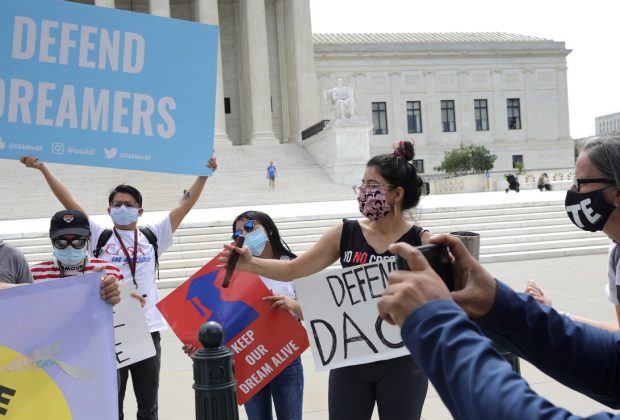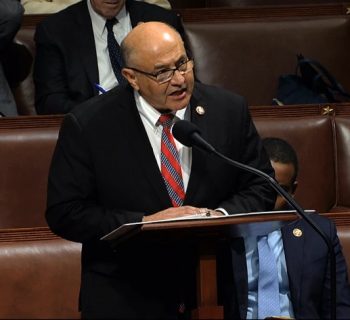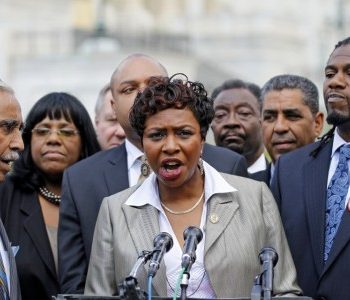Biden administration says DACA challenge should be rejected; States say standing clear because of direct costs of program.
By Andrew Kreighbaum | Bloomberg Law | JUL. 17, 2023 | Photo by Chip Somodevilla
A district court judge is set to decide whether a US Supreme Court win for the Biden administration’s immigration enforcement priorities means that a challenge to the legality of DACA should be rejected on the same grounds.
Attorneys for the Department of Homeland Security and the Mexican American Legal Defense and Educational Fund told District Court Judge Andrew Hanen that Republican-led states suing to overturn DACA lack standing for the same reasons that the high court ruled 8-1 that the states couldn’t challenge enforcement guidelines. Texas and other states challenging DACA argued in a response Friday that their standing wasn’t undermined by the case, and doesn’t involve any attempt to compel any prosecutions or arrests.
Last month Hanen heard oral arguments over whether regulations issued to codify the Deferred Action for Childhood Arrivals program last year solidified its legality. The program offers protections from deportation and work authorization to nearly 600,000 young people brought to the US as minors.
The case landed back in his court after the US Court of Appeals for the Fifth Circuit ruled DACA was enacted unlawfully when the Obama administration created the program more than a decade ago.
Since then, the Supreme Court’s ruling on the Biden administration’s ability to set immigration enforcement priorities surprised observers and offered DACA supporters hope that the program could be upheld on similar grounds. The high court there found Texas and Louisiana lacked standing to overturn 2021 guidance issued by Homeland Security Secretary Alejandro Mayorkas to focus enforcement at the agency on threats to national security. Although the court noted it was not deciding standing in the DACA case, attorneys for the government and MALDEF argued the same principles should apply.
“In light of that ruling, this court should consider whether states have standing in this case,” attorneys for DHS urged Hanen in written briefs. “Plaintiffs’ standing arguments here mirror those the Supreme Court rejected in Texas EP.”
The high court’s decision also nullified the states’ case that expenditures on social services for noncitizens establish an injury for purposes of standing, the government argued. The DACA program doesn’t directly compel states to take any action, but instead exercises DHS enforcement priorities involving individuals within the states, it said.
“As such, Plaintiffs have a particularly difficult challenge to establish actual injury—one that they cannot meet on this record, which includes no evidence that any Plaintiff incurred even a penny of loss due to DACA,” attorneys for MALDEF, which is intervening in the case in support of the program, argued.
But attorneys for Texas said in response that injuries in the case—such as added costs for issuing drivers licenses and health-care costs—aren’t based on a mere failure to make arrests but affirmative immigration relief. The Supreme Court’s recent ruling invalidating the Biden administration’s student debt cancellation reinforces that costs to the state are direct, they argued.
Just as financial harm to student loan servicers was directly traceable to the debt cancellation program, “the financial injuries imposed on Texas by DACA are direct rather than indirect,” they said.
Federal, State Benefits
How Hanen or judges at the Fifth Circuit, where the case will almost certainly be appealed again, rule on DACA could also hinge on how they interpret language in the Supreme Court ruling on benefits extended to immigrants. The high court’s opinion stated that a challenge to prosecution priorities as well as provision of legal benefits could lead to a different standing analysis.
The fact that a person granted deferred action under a policy like DACA may receive benefits such as work authorization shouldn’t alter the court’s conclusions on the case, the government argued. The states have no recognized interest in preventing the provision of those benefits, it said.
MALDEF argued that work authorization is granted by separate regulations, which the plaintiff states haven’t challenged.
But Texas contended that the provision of those benefits “provides a roadmap for this Court to analyze standing” in a way outlined by the majority in the enforcement priorities case.
The case is Texas v. United States, S.D. Tex., No. 1:18-cv-00068, 7/14/23.







